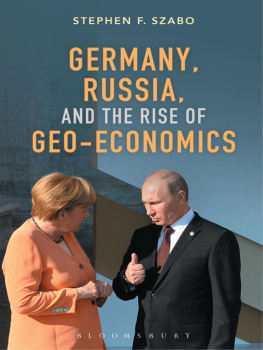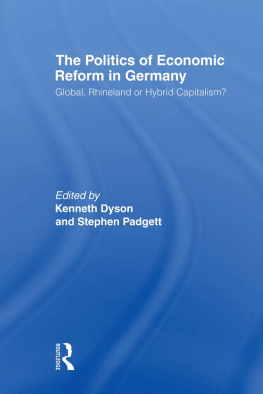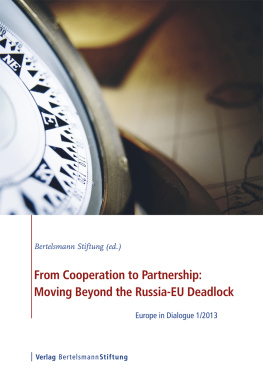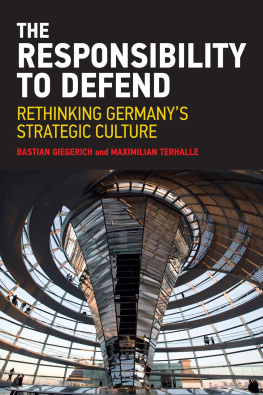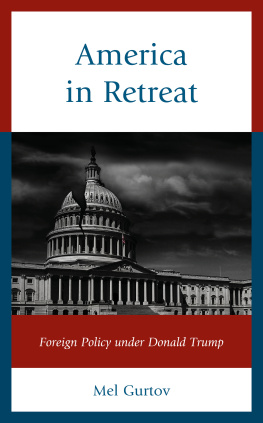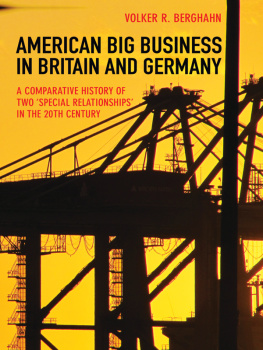This book is the product of my career as a Germany watcher, which began in the 1970s and has resulted in a number of books and articles, including one on the diplomacy of German unification and another on the United StatesGerman split over the Iraq war. Both of these books came out of my interest in the contemporary GermanAmerican relationship and how it has evolved from its highpoint with the peaceful unification of Germany in 1990 through the lowpoint of the split over the Iraq war. This split seemed to presage the end of the close relationship that had prevailed through the Cold War and the decade after unification. It also signaled a new kind of Germany, not only now unified but one that was become less a subject and more an actor internationally. It was a Germany that represented a new kind of power, an economic power, which is replacing the old type of military-based power embodied by the type of power the United States still is. Germany is a geo-economic power, the most successful export economy in the world, a country that now ranks as the most popular in many global opinion polls, and yet a power that downplays military power. Germany is a precursor of other emerging powers in the era of globalization, powers like Brazil, India, Indonesia, Singapore, which are gaining influence in global politics through economic prowess.
I was also interested in the changing RussianGerman relationship that seemed to me to be in flux ever since the government of Gerhard Schrder coalesced with it against the George W. Bush administration over the Iraq war. This was something new, the first time that a postwar German government sided with Russia against the United States on a matter of national security that the US administration deemed vital. The language of Schrder and his team, which stressed the independence and sovereignty of Germany and its need to be taken seriously, as well as implication that the American administration was treating Germany less as a partner and more as a satellite was also significant and indicated the return of Germany as an important independent player on the world stage. When the Grand Coalition government of Angela Merkel continued to split with the Bush administration over the RussiaGeorgia war and the policy of enlarging NATO to Georgia and Ukraine, it became clear how important Russia could be in the future of the GermanAmerican relationship. I wanted to explore the motivations and interests of Germany in its relationship with Russia to better understand where Germany was headed. I came to see that the Russian relationship was a case of a larger strategic approach, that of a geo-economic power, which presaged a major alteration of the traditional German approach as a civilian power. This approach requires a different type of foreign policy analysis, one that not only looks at the roles of political policymakers and opinion shapers, but also that of the private sector and lobbyists. Germanys Russia policy cannot be understood without an understanding of the dynamics of economic relationships and the role of German business. Here again, Germany is one case in a larger trend already identified by such writers as Steve Coll, Anne Marie Slaughter, Thomas Friedman, and Hans Kundnani to name a few. This is a new type of statecraft that is the product of the era of globalization and marketization, which will define the twenty-first century.
This book, then, is an examination of Germany and how it is changing. While Russia is the case chosen, given that geo-economics are so predominant in the relationship, this is a book about Germany not so much about Russia. I am not a Russia specialist and am not trying to assess Russia as Russia but more how Russia is viewed by the leading power in Europe today and the implications for Germany, Europe, and the United States.
This book is the product of two years of research conducted while I was directing the Transatlantic Academy in Washington. The views and analysis are purely my own and do not in any way reflect the views of the Transatlantic Academy or its partners. I am grateful to many people who assisted in the research of this volume, especially to my two main research assistants, Judit Vsrhely-Kondor and Thedore Reinert, both former students at the Nitze School of Advanced International Studies, Johns Hopkins University, an institution I have been proud to have been associated with for two decades and to Jessica Hirsch for her help with the bibliography. In addition, thanks to Edward Berlin, Caroline Mkusch, Leonie Willenbrink and Joana Allamani for their research assistance. Thanks also to Samuel Charap, Bartek Nowak, Ralph Thiele, Rolf Nikel, and Ash Jain for their comments on portions of the manuscript. Special thanks to Pia Bungarten and the Friedrich Ebert Stiftung for including me in a study group on Germany, Russia, and the United States, which provided invaluable insights for this study. Thanks to Karl Cerny my Professor and Doktorvater at Georgetown who directed me toward a life long interest in Germany. Finally thanks to my wife Joan, whose patience and support was, as always, crucial.
Drang nach Osten
It is July 2010. The venue is sunny Yekaterinburg, and the occasions is the annual Petersburg Dialogue between German and Russian leaders. Yekaterinburg is an industrial town behind the Ural Mountains and is the place where the tsar and his family were murdered in 1918 and where Boris Yeltsin began his early career. Its German name was changed back from the Soviet Sverdlovsk. Standing in front of the cameras are Angela Merkel, the German chancellor, and Dmitry Medvedev, the Russian president. Merkels relationship with Russia is complicated. She grew up in communist East Germany and became a fluent Russian speaker during her schoolgirl days. While she developed a sympathy for Russian culture, her experience in the former East Germany seems to have made her a Russia skeptic. She, like Barack Obama, is an unemotional realist, who understands the nature of Russian power, the immutable nature of Russian authoritarianism, and that countrys central importance to Germany.
While Medvedev represented the outward looking, friendly face, the real power player, Russian prime minister Vladimir Putin, had a deep connection with Germany. He joined a German language club while a young student in Russia, surprising his teachers who thought he was not interested in anything academic. He picked up the language easily and used this background to become a KGB agent in Dresden, and when he visits Saxony he speaks of returning home. He sent one of his children to a German school in Russia and has employed several former members of the East German secret service, the Stasi, in Russian enterprises. When he meets German leaders, he speaks with them in fluent German and he impressed the Bundestag with his command of the language. He thought he knew how to manipulate the former East German schoolgirl now turned German chancellor. At one of their early meetings, knowing that Merkel, Merkel would later recount that when she hears Putin speak German, she is reminded of listening to an interrogator.
Once Merkel came to power, much was made of her desire to promote democracy and human rights in Russia. She told American politicians that her background in East Germany made her an especially strong advocate of democracy and liberty. During her first trip to Moscow, she met with human rights and democracy activists to the consternation of Putin. This was in sharp contrast to her predecessor Gerhard Schrder, who was a particularly close friend of Putin, having celebrated Christmas and birthdays together and using nicknames such as Gerd and Volodya. Putin had sent a Cossack chair to Schrder for his private home, and Schroeder adopted two Russian girls through Putins intervention. After leaving office, Schroeder became a key executive in a European consortium dominated by Gazprom, the massive Russian energy concern. He referred to Putin as a flawless democrat and was careful not to criticize his policy in public while being openly critical of President George W. Bush.

